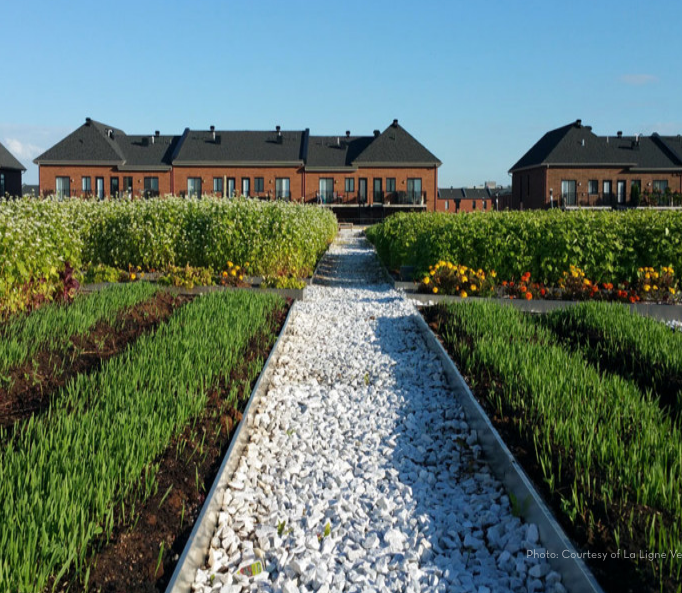Epic 25,000 Square Foot Garden Opens on Rooftop of Montreal Supermarket
Epic 25,000 Square Foot Garden Opens on Rooftop of Montreal Supermarket
By: Leeron Hoory | September 7, 2017
Supermarkets across North America shelve fruits and vegetables that have been imported from thousands of miles away. Bananas from the Dominican Republic can be found next to avocados from Mexico. But last month, one supermarket in Montreal announced that it will begin importing produce from just a few feet away– from their own rooftop, in fact.
Located in the Saint-Laurent borough of Montreal, IGA Extra Famille Duchemin plans to sell the food it grows on the supermarket’s roof, which will include a variety of 30 different fruits and vegetables including lettuce, peppers, herbs, and tomatoes. It will also support eight Alveole bee hives with the intention of producing an estimated 600 jars of honey to the shelves. At 25,000 acres, it will be the largest organic rooftop garden in Canada in addition to being the first supermarket in the country to sell food grown on its own roof, according to the family-owned grocery.
“A green roof garden allows us to nourish our passion for food while reducing our environmental footprint, something that is particularly important to us,” Richard Duchemin, co-owner of IGA Extra Famille Duchemin. The supermarket is part of the International Grocers Alliance (IGA), which consists of around 5,000 supermarkets around the world. “We are happy to give life to this innovative project and hope it encourages other companies to follow suit,” Duchemin said.
The rooftop garden was created over the course of more than a year in collaboration with La Ligne Verte, or The Green Line: Green Roof, a company that works on green roofs and landscaping, in addition to Sobeys Quebec, the largest food retailer in Canada.
IGA Extra Famille Duchemin is far from the first supermarket to open a rooftop garden. While growing produce in cities is not new, the growing trend of urban farming for commercial purposes started less than a decade ago. Green Roofs for Healthy Cities, a nonprofit organization based in Toronto that facilitates and promotes the development of urban rooftop gardens across North America, recently told Garden Collage that it first began teaching its garden rooftop training course in 2010.
Urban agriculture offers a solution to the rapid rate of population growth in urban cities. It is estimated that by 2050, sixty percent of the world will be living in cities, and more of them are turning to sustainable solutions for local food growth. For instance, one of the largest rooftop gardens across North America is the Brooklyn Grange, which is 2.5 acres (108,000 square feet) and spans across two New York City rooftops, growing over 50,000 pounds of organic produce per year. Chicago Botanic Garden turned a 20,000 square foot garden into a rooftop farm in 2013, becoming the largest rooftop farm in the Midwest. According to Green Roof for Healthy Cities’s most recent survey of its corporate members, Toronto, Chicago, Washington D.C., and Seattle are four of the leading cities with the highest square footage of green roofing.
However, not everyone is convinced that urban agriculture is a solution to food security, particularly given the challenges of scale. In an article for Ag Professional, Maurice Hladik, author of Demystifying Food from Farm to Fork, argued that while there may be a rising trend in urban farming, it cannot realistically contribute a significant portion of food. “I would be surprised if the food production potential of the available urban land would amount to even one percent of that available on conventional farms utilizing open fields, pastures, and rangeland,” Hladik wrote.
Still, this doesn’t change the fact that more than two-thirds of the nation’s food comes from crops grown outside of the country, according to one 2016 study. Urban rooftop gardens, like the one on top of IGA Extra Famille Duchemin, ensure that at least some of this produce comes from around the corner.








